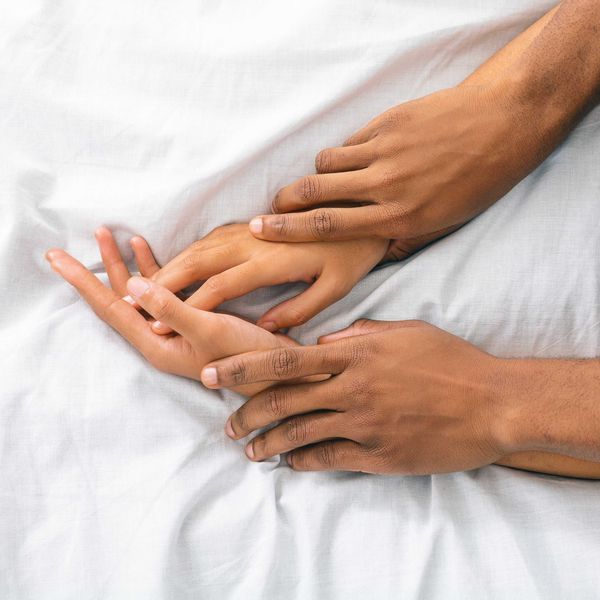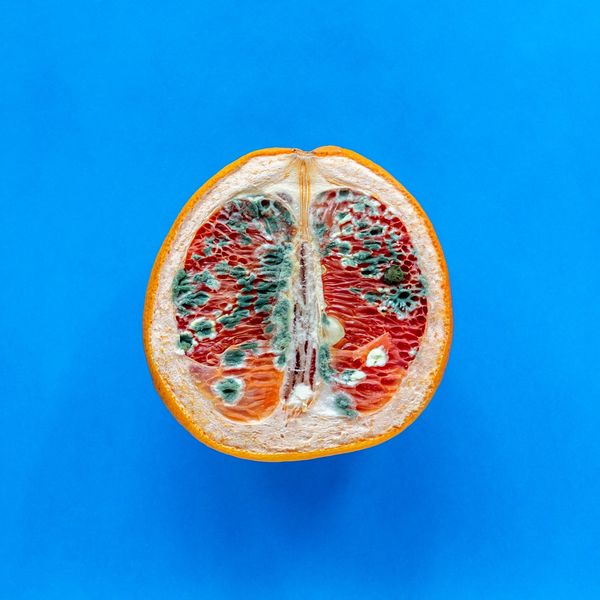It's Time To Start Taking Low Iron Levels Seriously, So We Asked A ‘Blood Doctor’ How To Do It
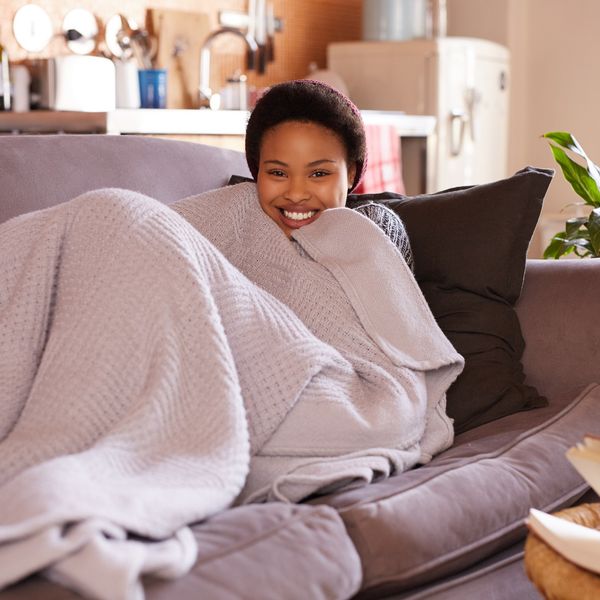
I can still remember the look on my doctor’s face when he read back my hemoglobin levels after taking routine blood work.
“You should be in the hospital right now,” he said with a look of concern on his face. Unaware of the weakened state that my body was in at the time, I was confused by his reaction. “Your hemoglobin levels are at 7gm/dL,” he told me.
“And what are the normal levels?” I asked him, now with equal concern. “For women, normal levels are between 12.3 gm/dL and 15.3 gm/dL.”
It was at that moment that I realized that there was nothing “normal” about my perpetual fatigue and low energy levels — as they all pointed back to one thing: my anemia.
It wasn’t long after my appointment that I started on iron transfusions, and over the four sessions, it felt like I was given an entirely new body. One with more energy, better sleep patterns, less intense periods, and no more fatigue. The surge in energy made me wonder why I went so long to make my anemia a top health priority. What would've happened had I not gone in for the routine check-up sooner?
@andreadeanmd Take iron deficiency seriously. It can affect your quality of life. #irondeficiency #irondeficiencyanemia #lowhemoglobin #anemiaproblems #anemiasymptoms #blackwomenoftiktok #hispanictiktok #tiktocdocs
What Is Anemia and Its Symptoms
Iron deficiency anemia (IDA) is a medical condition characterized when the body lacks enough iron to produce all of the hemoglobin necessary for healthy red blood cells (RBCs). Hemoglobin is a protein in red blood cells that helps carry oxygen from the lungs to the rest of the body.
Because we need oxygen to regulate proper blood flow, individuals with anemia can find themselves experiencing irregular heart rates and extreme fatigue, which can lead to serious health complications if left unchecked.
Other symptoms of anemia include:
- Cold extremities
- Weakness
- Pica, or the desire to eat non-nutritional foods like clay or ice
- Dizziness
- Hair loss
- Brittle nails
- Brain fog
- Shortness of breath
- Restless leg syndrome
There are several types of anemia, each with different underlying causes, such as nutritional deficiencies in iron, vitamin B12, or folic acid deficiency, chronic diseases like blood loss from injuries or medical conditions, or genetic factors like sickle cell anemia.
Anemia and Black Women
While having anemia at times gets overlooked as a serious health condition or even reduced down to “always being cold” and eating ice, it’s important for those living with anemia to understand the causes and long-term effects of this condition.
Studies show that “anemia in Black women and Hispanic women occurs 2 to 3 times more often than in Caucasian women.” While it is still unknown why women of color have a higher occurrence of iron-deficiency anemia, key factors that cause anemia, such as your body’s inability to absorb iron and low intake of essential nutrients like vitamin B12 and B9, should be taken with a great amount of care and consideration as you prioritize your health and well-being.
That’s why we’ve tapped Hematologist/Oncologist of Hematology Connect Andrea R. Dean, MD, to provide us with insight on how to manage and treat our anemia because it’s a condition worth taking seriously.
xoNecole: Are there genetic factors that make Black women more susceptible to anemia?
Dr. Dean: Black women are more susceptible to anemia due to iron deficiency, which is most prevalent in this group. Iron deficiency is commonly due to heavy menstrual bleeding from fibroids. Black women have a greater lifetime incidence of fibroids than any other group of women. This likely has a genetic component, but more research is needed.
xoN: Iron pills are commonly recommended to aid in low iron. From your expertise, what are some other supplements or treatments that can help manage anemia?
Dr. Dean: Treatment for anemia depends on the underlying cause. If anemia is due to B12 deficiency or folate deficiency, replacement of these vitamins is needed. If anemia is due to gastrointestinal bleeding, a referral for an EGD and colonoscopy is needed to locate the source of [the bleeding] and stop it. If anemia is due to iron deficiency, you can take iron pills, liquid iron solution, or intravenous iron.
xoN: What dietary changes can someone make to improve their iron intake and absorption?
Dr. Dean: You can eat green leafy vegetables and red meats to increase iron in your diet. If taking iron pills, absorption is better when taken in the morning on an empty stomach every other day.
xoN: At times, anemia and low iron can be overlooked as a health concern, but what are the potential long-term consequences of untreated or chronic anemia in Black women?
Dr. Dean: Untreated anemia can be detrimental to your health. Your hemoglobin carries oxygen to organs throughout your body. If you are anemic or your hemoglobin is low, your organs are not receiving the oxygen they need to properly function. You can pass out from being anemic, and low hemoglobin stresses your heart muscles, and some patients can experience a heart attack. Additionally, the symptoms from anemia can be debilitating and can decrease your quality of life.
xoN: Can low iron be permanently corrected, or does it have to be managed throughout one’s life?
Dr. Dean: The underlying cause of iron deficiency will determine whether it can be corrected. If iron deficiency is due to decreased absorption from H. pylori, once the bacteria infection is treated, iron deficiency should resolve. If iron deficiency is due to heavy menstrual bleeding, it will likely have to be managed until a woman enters menopause unless she seeks treatment to stop or slow down periods. If iron deficiency is due to gastrointestinal bleeding, it might have to be managed throughout one’s life if they have arterial venous malformations.
Let’s make things inbox official! Sign up for the xoNecole newsletter for daily love, wellness, career, and exclusive content delivered straight to your inbox.
Featured image by Goodboy Picture Company/Getty Images
Exclusive: Viral It Girl Kayla Nicole Is Reclaiming The Mic—And The Narrative
It’s nice to have a podcast when you’re constantly trending online. One week after setting timelines ablaze on Halloween, Kayla Nicole released an episode of her Dear Media pop culture podcast, The Pre-Game, where she took listeners behind the scenes of her viral costume.
The 34-year-old had been torn between dressing up as Beyoncé or Toni Braxton, she says in the episode. She couldn’t decide which version of Bey she’d be, though. Two days before the holiday, she locked in her choice, filming a short recreation of Braxton’s “He Wasn’t Man Enough for Me” music video that has since garnered nearly 6.5M views on TikTok.
Kayla Nicole says she wore a dress that was once worn by Braxton herself for the Halloween costume. “It’s not a secret Toni is more on the petite side. I’m obsessed with all 5’2” of her,” she tells xoNecole via email. “But I’m 5’10'' and not missing any meals, honey, so to my surprise, when I got the dress and it actually fit, I knew it was destiny.”
The episode was the perfect way for the multihyphenate to take control of her own narrative. By addressing the viral moment on her own platform, she was able to stir the conversation and keep the focus on her adoration for Braxton, an artist she says she grew up listening to and who still makes her most-played playlist every year. Elsewhere, she likely would’ve received questions about whether or not the costume was a subliminal aimed at her ex-boyfriend and his pop star fiancée. “I think that people will try to project their own narratives, right?” she said, hinting at this in the episode. “But, for me personally – I think it’s very important to say this in this moment – I’m not in the business of tearing other women down. I’m in the business of celebrating them.”
Kayla Nicole is among xoNecole’s It Girl 100 Class of 2025, powered by SheaMoisture, recognized in the Viral Voices category for her work in media and the trends she sets on our timelines, all while prioritizing her own mental and physical health. As she puts it: “Yes, I’m curating conversations on my podcast The Pre-Game, and cultivating community with my wellness brand Tribe Therepē.”
Despite being the frequent topic of conversation online, Kayla Nicole says she’s learning to take advantage of her growing social media platform without becoming consumed by it. “I refuse to let the internet consume me. It’s supposed to be a resource and tool for connection, so if it becomes anything beyond that I will log out,” she says.
On The Pre-Game, which launched earlier this year, she has positioned herself as listeners “homegirl.” “There’s definitely a delicate dance between being genuine and oversharing, and I’ve had to learn that the hard way. Now I share from a place of reflection, not reaction,” she says. “If it can help someone feel seen or less alone, I’ll talk about it within reason. But I’ve certainly learned to protect parts of my life that I cherish most. I share what serves connection but doesn’t cost me peace.
"I refuse to let the internet consume me. It’s supposed to be a resource and tool for connection, so if it becomes anything beyond that I will log out."

Credit: Malcolm Roberson
Throughout each episode, she sips a cocktail and addresses trending topics (even when they involve herself). It’s a platform the Pepperdine University alumnus has been preparing to have since she graduated with a degree in broadcast journalism, with a concentration in political science.
“I just knew I was going to end up on a local news network at the head anchor table, breaking high speed chases, and tossing it to the weather girl,” she says. Instead, she ended up working as an assistant at TMZ before covering sports as a freelance reporter. (She’s said she didn’t work for ESPN, despite previous reports saying otherwise.) The Pre-Game combines her love for pop culture and sports in a way that once felt inaccessible to her in traditional media.
She’s not just a podcaster, though. When she’s not behind the mic, taking acting classes or making her New York Fashion Week debut, Kayla Nicole is also busy elevating her wellness brand Tribe Therepē, where she shares her workouts and the workout equipment that helps her look chic while staying fit. She says the brand will add apparel to its line up in early 2026.
“Tribe Therepē has evolved into exactly what I have always envisioned. A community of women who care about being fit not just for the aesthetic, but for their mental and emotional well-being too. It’s grounded. It’s feminine. It’s strong,” she says. “And honestly, it's a reflection of where I am in my life right now. I feel so damn good - mentally, emotionally, and physically. And I am grateful to be in a space where I can pour that love and light back into the community that continues to pour into me.”
Tap into the full It Girl 100 Class of 2025 and meet all the women changing game this year and beyond. See the full list here.
Featured image by Malcolm Roberson
If there is one thing that I am going to do, it’s buy myself some scented soy candles. And, as I was looking at a display of them in a TJ Maxx store a couple of weekends ago, I found myself wondering just who decided which scents were considered to be “holiday” ones. The origin stories are actually pretty layered, so, for now, I’ll just share a few of ‘em.
I’m sure it’s pretty obvious that pine comes from the smell of fresh Christmas trees; however, scents like cloves, oranges, and cinnamon are attributed to two things: being natural ways to get well during the cold and flu season, and also being flavors that are used in many traditional holiday meals.
Meanwhile, frankincense and myrrh originate from the Middle East and Africa (you know, like the Bible does — some folks need to be reminded of that—eh hem — Trumpers) and ginger? It too helps with indigestion (which can definitely creep up at Thanksgiving and Christmas dinner tables); plus, it’s a key ingredient for ginger snaps and gingerbread houses. So, as you can see, holiday-themed scents have a rhyme and reason to them.
Tying this all in together — several years ago, I penned an article for the platform entitled, “Are You Ready To Have Some Very Merry ‘Christmas Sex’?” Well, in the spirit of revisiting some of that content, with a bit of a twist, I decided to broach some traditional holiday scents from the perspective of which ones will do your libido a ton of good from now through New Year’s Eve (check out “Make This Your Best NYE. For Sex. EVER.”).
Are you ready to check some of them out, so that, whether it’s via a candle, a diffuser, some essential oil, or some DIY body cream (check out “How To Incorporate All Five Senses To Have The Best Sex Ever”), you can bring some extra festive ambiance into your own boudoir? Excellent.
1. Vanilla
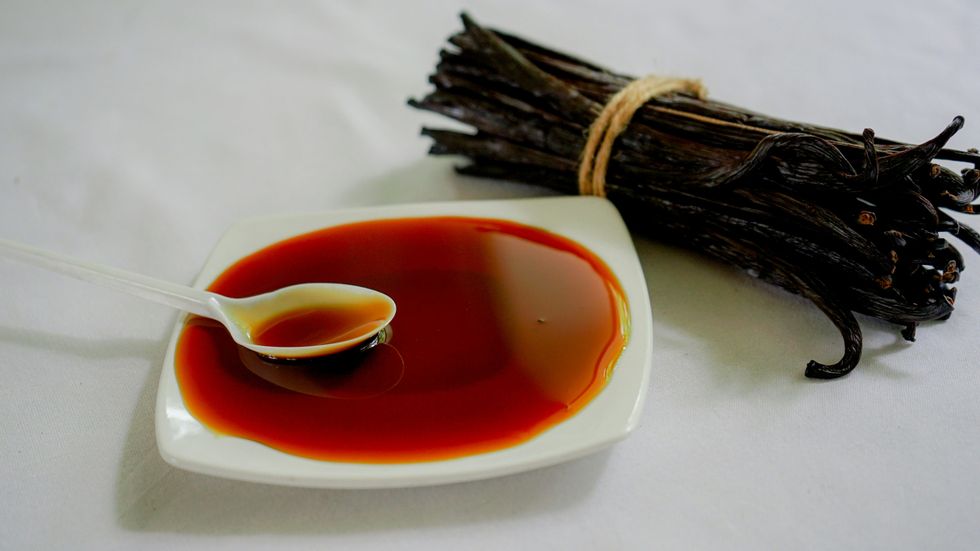
Unsplash
When it comes to holiday desserts, you’re going to be hard-pressed to find recipes that don’t include vanilla — and that alone explains why it is considered to be a traditional holiday scent. As far as your libido goes, vanilla is absolutely considered to be an aphrodisiac — partly because its sweet scent is considered to be very sensual. Some studies even reveal that vanillin (the active ingredient in vanilla) is able to increase sexual arousal and improve erectile dysfunction in men. So, if you adore the smell, here is more incentive to use it.
2. Frankincense

Unsplash
Although, typically, when people think about frankincense (and myrrh), it’s in the context of the gifts that the wise men brought Christ after he was born; it’s a part of the biblical Christmas story. However, frankincense goes much deeper than that. Sexually, since it has an earthy and spicy scent, some people like to use it to meditate (check out “What Exactly Is 'Orgasmic Meditation'?”). Also, since it has the ability to put you in a better mood, soothe and soften your skin and maintain your oral health — with the help of frankincense, every touch and kiss can be that much…sexier.
3. Cinnamon
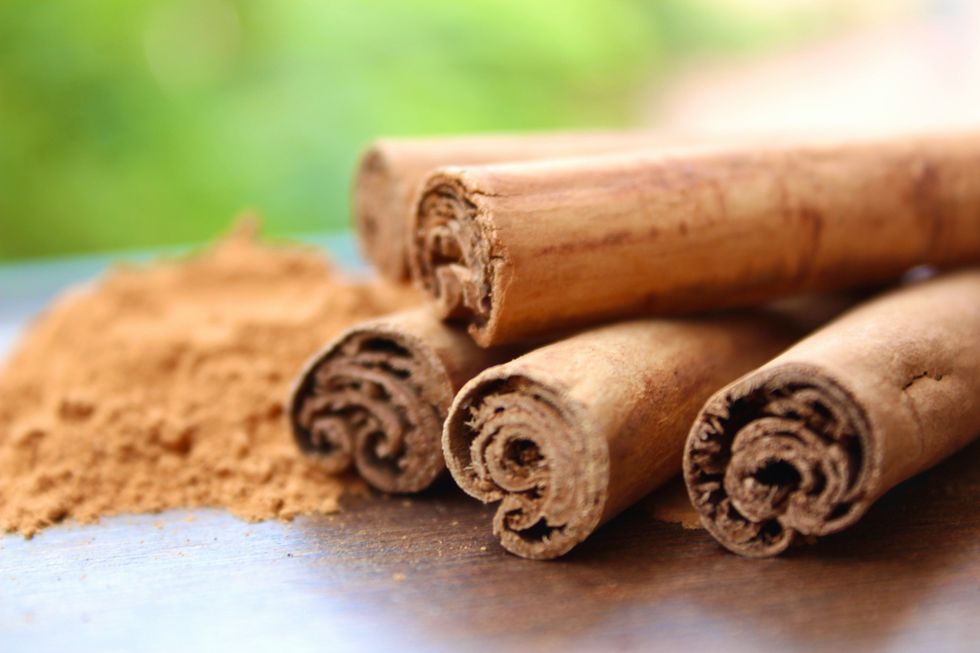
Unsplash
I already gave cinnamon a shout-out in the intro. Personally, I’ve been a fan of it, in the sex department, for a long time now (check out “12 ‘Sex Condiments’ That Can Make Coitus Even More...Delicious”). When it’s in oil form, it can be very sweet to the taste while sending a warm sensation throughout the body — which is why the giver and receiver of oral sex can benefit from its usage. Beyond that, cinnamon helps to increase blood flow to your genital region, elevate sexual desire and, some studies say that it can even help improve fertility. Beautiful.
4. Peppermint
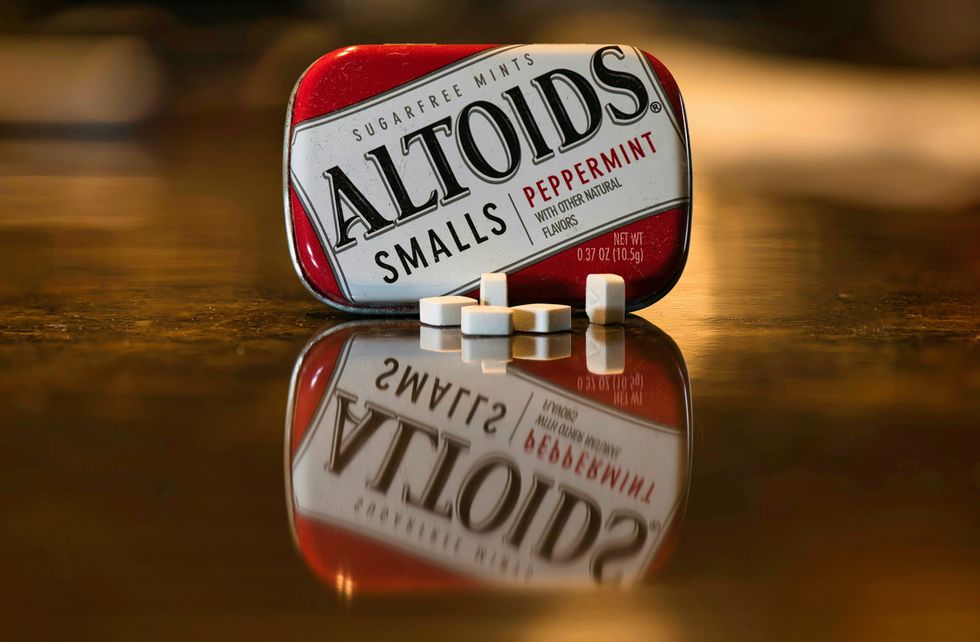
Unsplash
If there’s a signature candy for the holiday season, it’s probably a candy cane — which automatically puts peppermint in the running for being an official holiday scent. Pretty much, in any form, it’s got your sex life’s back because it’s hailed as being a sexual stimulant; in part, because its smell is so invigorating. Plus, it helps to (eh hem) ease headaches, it gives you more energy and it can definitely help to freshen your breath. Also, that minty sensation? The same thing that I said about cinnamon can apply to peppermint too (if you catch my drift).
5. Ginger
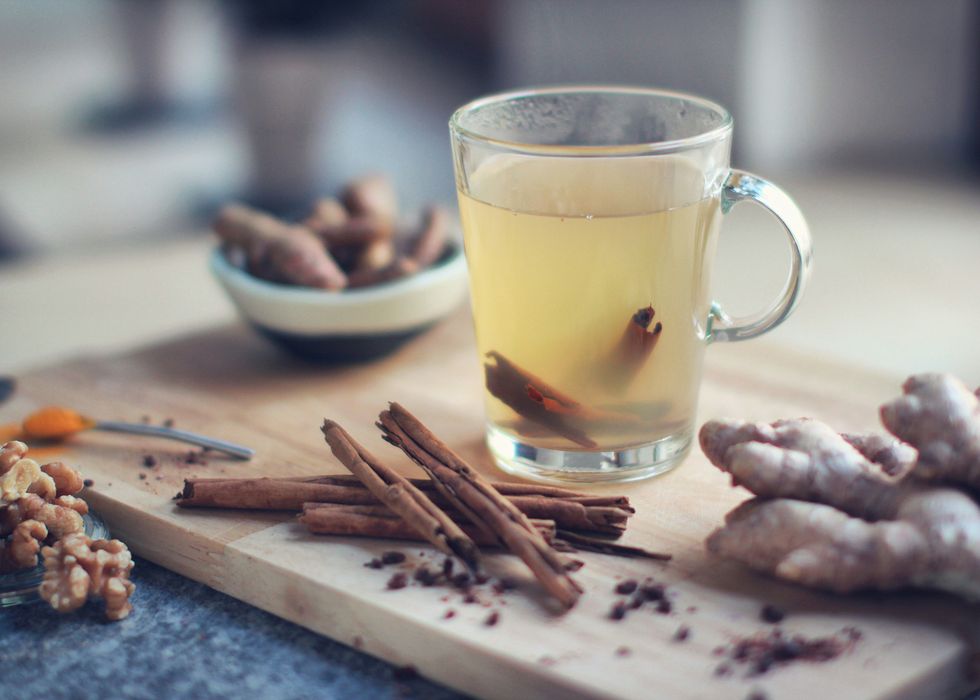
Unsplash
Whether it’s in a meal or in your bedroom, ginger is going to produce results that are hella spicy. On the sex tip, science has praised ginger for being able to increase sexual arousal, improve blood circulation (which intensifies orgasms) and strengthen fertility for many years. Scent-wise, I find it to be one that both men and women enjoy because it is both woodsy and sweet. So, if you’ve got some massage oil in mind, adding some ginger is a way to please you both.
6. Pomegranate
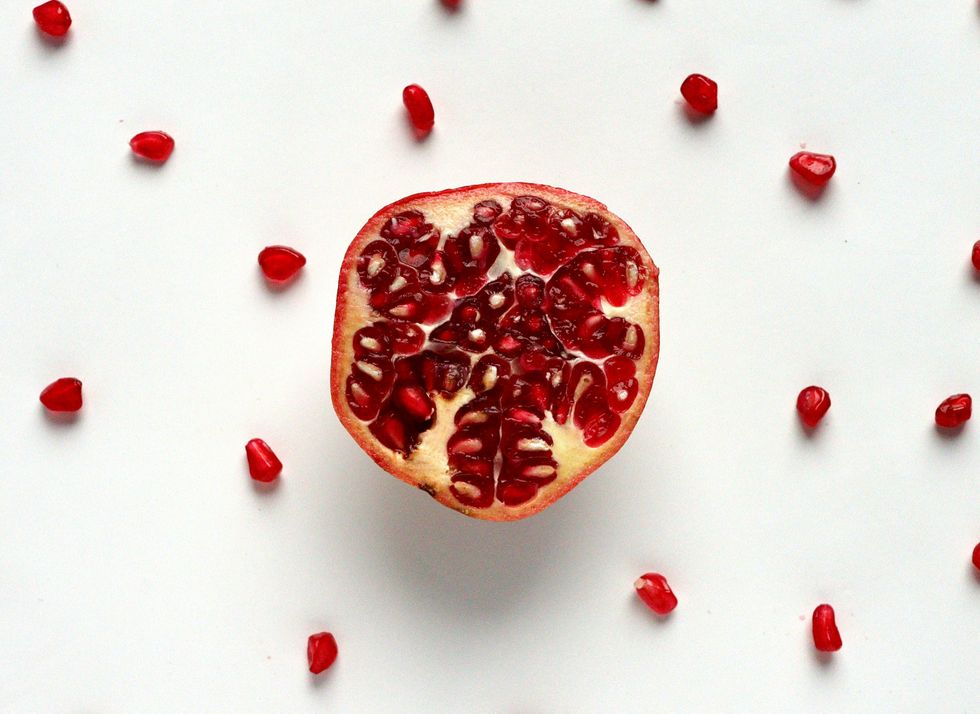
Unsplash
September through December is the time of year when pomegranates are considered to be in season. And, as someone who is a Rosh Hashanah observer, I have a personal adoration for them because I am aware of the various things that they symbolize in Hebrew culture including the fact that they are a fruit that represents love and fertility. So yeah, they would absolutely be an aphrodisiac — one that is perfect for this time of the year. While consuming it helps to boost testosterone levels in both men and women, the floral bittersweet smell that it produces can help to reduce stress while promoting relaxation (like most floral scents do) — and the more relaxed you are, the easier it is to climax.
7. Nutmeg

Unsplash
Another signature seasoning during the holiday season is nutmeg. It’s perfect in Thanksgiving sweet potato (or pumpkin) pie and Christmas morning French toast. And yes, it can also make your sex life better. If you consume it, it can intensify your libido and, overall, its warm-meets-spicy-meets-sweet smell is so inviting that it is considered to be a pretty seductive scent.
8. Cloves
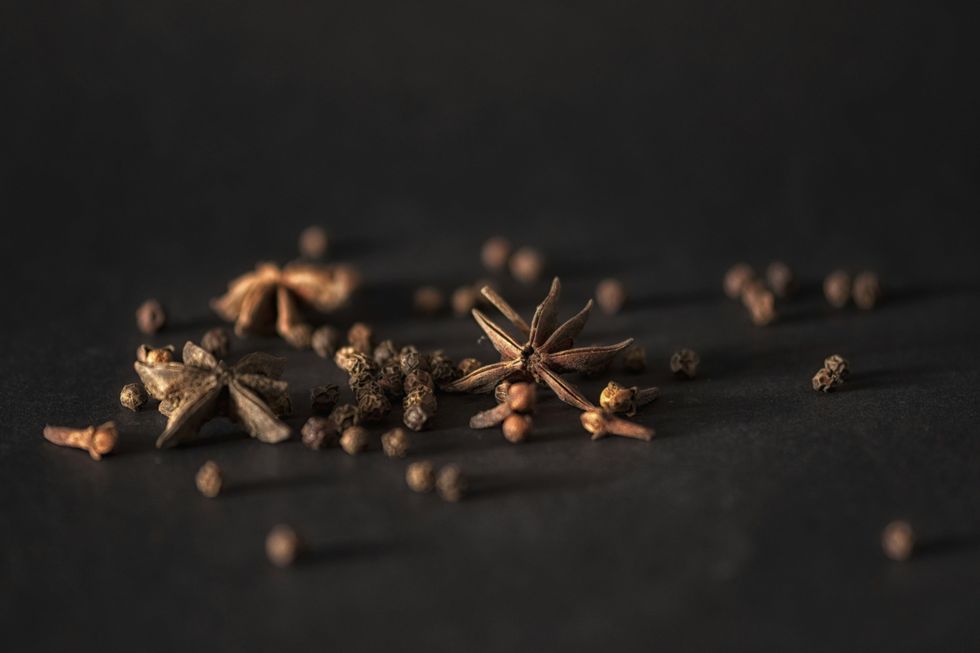
Unsplash
I ain’t got not one lie to tell you — if you’ve got a toothache, put some clove oil on that bad boy and send me a Christmas present for putting you on game. Aside from that, as I round all of this out, cloves are another holiday scent that can do wonders for your sex life. For men, it has the ability to significantly increase sexual arousal and improve stamina and endurance. For men and women alike, it also has a reputation for strengthening sexual desire. And for women solely? Well, if you want an all-natural way to increase natural lubrication down below — the scent and and feel (in DILUTED oil form) can make that happen. It can make the holidays especially special…if you know what I mean.
Ah yes — the atmosphere of the holidays and what it can do.
Take it all in! Scent ‘n whatever stimulating that comes with it! #wink
Let’s make things inbox official! Sign up for the xoNecole newsletter for love, wellness, career, and exclusive content delivered straight to your inbox.
Featured image by Giphy



